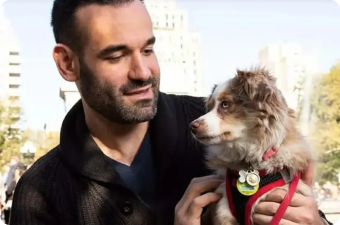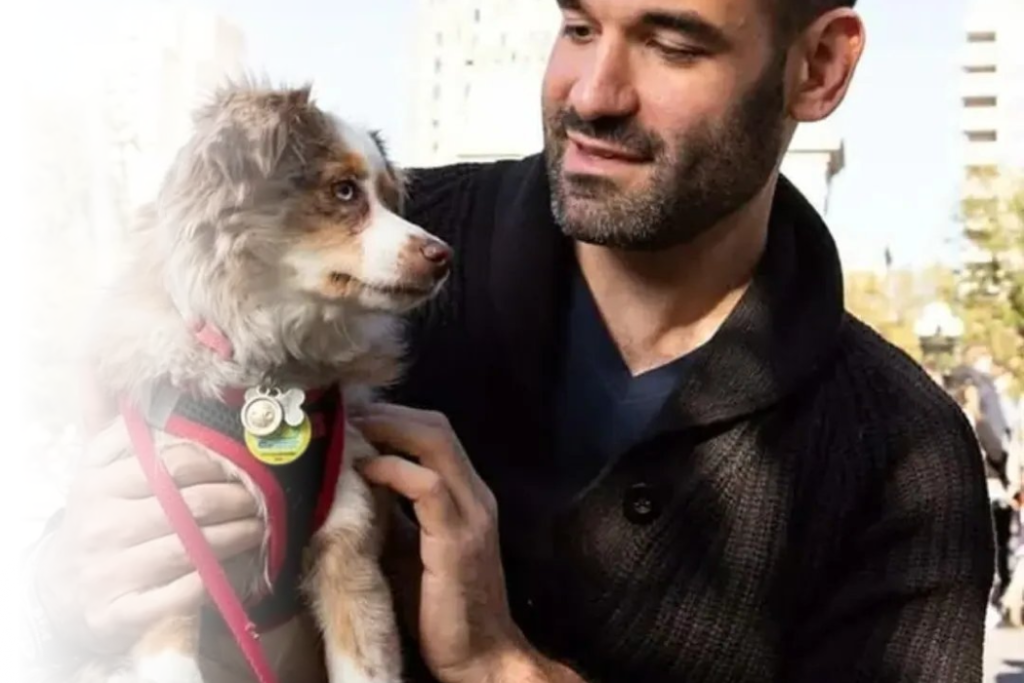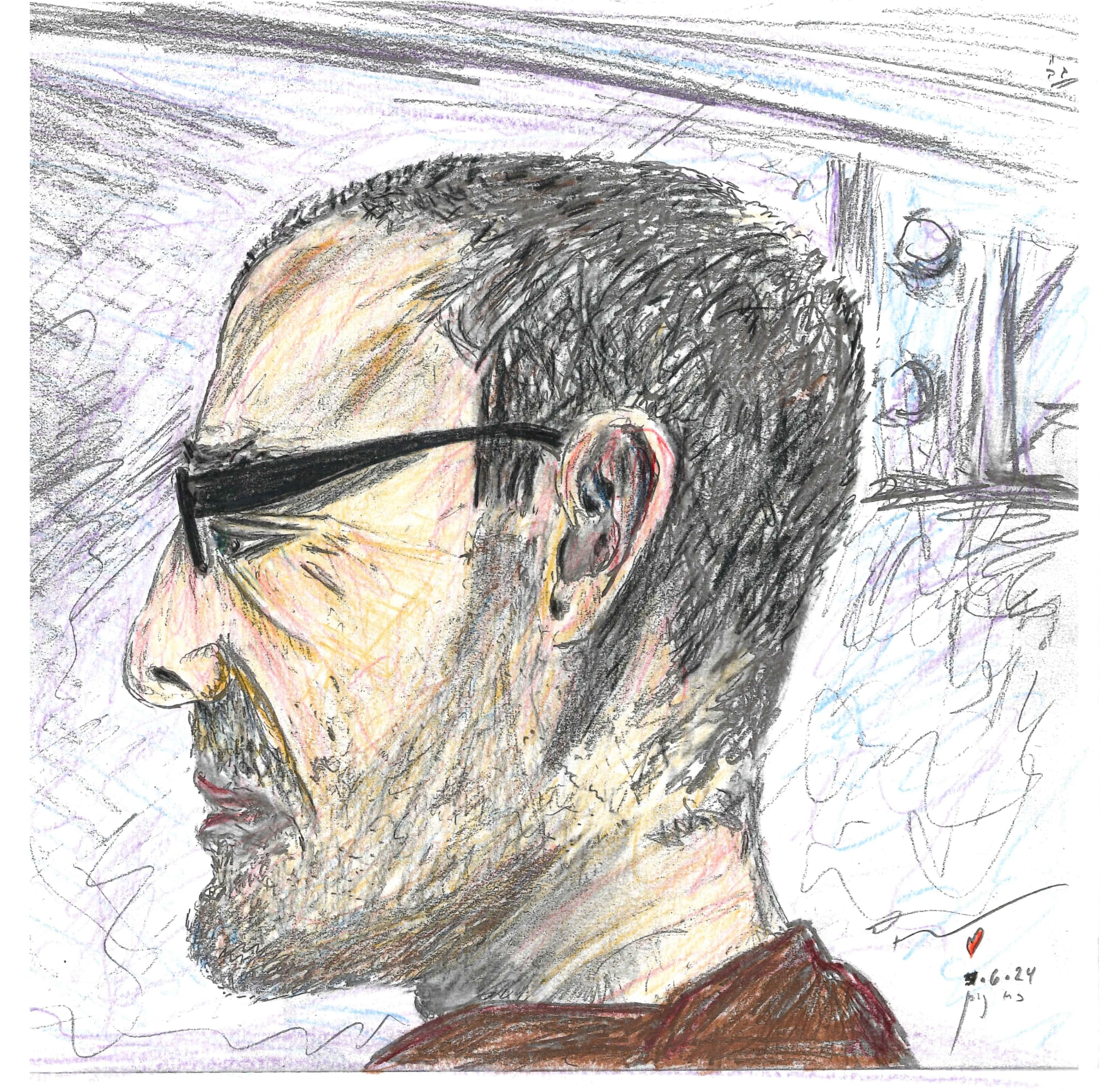“Everyone leaves prison with a million-dollar plan,” says Muslim Mike, as he’s affectionately known. “My plan is to be comfortable, have a steady job, a roof over my head, and a fridge brimming. Let the money chase me.”
Mike, 6’2 with a physique that speaks to discipline, works in food service and talks about ingredients with a passion. He is nearing the end of a 20-year stint for robbing armored Brinks trucks.
“I was an adrenaline junkie. It wasn’t about the money, but it wasn’t not about it.”
Recently married, with a baby daughter, 24-year old Mike McCarthy needed to make money, and his, “comfort with death,” — losing parents at a young age and seeing death abound in his South Florida “hood” — combined with his adrenaline addiction led to some wild choices.
He was also, he shares, under the influence of a heavy drug addiction.
“I know when I get out I’m going right into drug counseling, because I know I’ve stopped, but I haven’t quit,” he says despite years of sobriety. “I learned that in RDAP. The counselor opened a bag of bleach power and I saw it and wanted to snort it… and I realized I stopped but didn’t quit. That’s what they showed us.”
Those of us who know Mike, including his best friends, Zater and Uri, believe otherwise. Mike has come a long way.
A devout Muslim, a faith he found in prison (it’s also found elsewhere — a few Middle Eastern countries and New Jersey), he credits his regular schedule of prayer and his belief in G-d’s providence for saving him and keeping him clean. But he worries that the limited financial responsibility inside has not prepared him for the pressures of outside, “when I get to that point where I’m about to be tossed because I can’t make the next thirty-days rent because I didn’t do what I was supposed to the last month.”
Nobody who knows Mike is worried that he will ever find himself there again, financially or mentally, and I’m not sure he really does, either — but that’s what drives him.
“Prison teaches you to see clearly through muddy waters like a crocodile,” he explains. “You have to see through the filth, you have to keep a clear vision of your goals despite all the dirt and the waves…”
“My jokes about the guys OD-ing on K2, that’s gallows humor,” he says. “It’s what gets you through the darkness.”
There have been two ODs (overdoses) in the Glass House in the past two nights, like clockwork. K2 is running rampant through the prison, often laced with deadly ingredients like fentanyl.
A man drops, his breath and heart stop. Someone notices and a dozen men begin slamming, kicking, and pounding the two-story glass wall separating Glass House from G-Unit, pleading for the C.O. 40-feet away in a barred-and-glassed-in booth in G-unit to notice them call for help. There’s no panic button or emergency phone in any cell or unit and minutes are lost to this. A few officers show up 10 minutes later, despite being less-than 90 seconds away, and stab Narcan into the men who’ve died temporarily (or so it seems) in unit.
Two nights ago, it was a young, rotund Bahamian rumored to bring “drama”. We were all sure he was dead.
Hours later, he was back in the unit, smiling. Yesterday morning, Dec 25, a holiday that’s notably Christian (a messianic cult of middle-eastern origin, with numerous branches worldwide, each heavily-influenced by local culture and beliefs), he pensively, but sweetly wished me a Happy Hanukkah, close enough, and endearing. The next day, he was back to shilling commissary items in the manner junkies do to score stamps (double-sided, used stamps are used as currency inside) for their next hit.
Last night it was a 60-something, soft-spoken wallflower who teaches in education and looks like he could be your dad’s friend. They say he’s a great teacher. His face, held upright by the officers’ hands as they wheeled him out of the unit, looked like a drooling baby dying, glassy eyes lost in oblivion. They wheeled him right past my feet, but he was millions of miles away.
He, too, walked back in a couple hours later, smiling gleefully — coming back from the dead seems to do that.
Catch-and-release doesn’t seem like much of a deterrent, but it probably reduces the paperwork.
“As much as I want to help those guys on drugs, I know that… I remember what they taught us about lifeguarding.
My family were survivalists and taught us young,” Mike continues, “If a man is drowning, you don’t approach them from the front, because they’ll pull you down. You approach them from the rear, and you knock them out if they fight, or you kick away and save yourself.”
“So it’s like these men are drowning…”
“Exactly, and they will pull you down if you get too close.”
Many young men, Mike explains, come here for the party. “Their friends are here, so they come. They’re all from the same neighborhood, poor, they have nothing, so they get themselves caught on some gun charge or whatever and get thrown in with their friends. They’re all housed together. It’s a party.”
It’s been the same for decades, he says, “but the men now aren’t the same as they were when I came in.”
“Softer?”
“They’re not softer. They have it in them. But they don’t have the loyalty, the discipline. Man, in my day if all my neighborhood were inside, we’d be ruling the place. There would be a party every night, female guards pregnant, our babies outside on the street.”
As Mike’s face lights up, it’s clear there’s no exaggeration, 20 years ago the man who walks to chapel with a prayer rug and a kind word for all passerbys (as I’ve noted, the Muslim and Jewish guys get along exceptionally well here — friends and brothers who look after one-another) was a different person.
“Be we had loyalty, discipline, a value system.”
Mike won’t let these men pull him down, but he’s not passive when he sees them headed the wrong way. A leader on the food services team, he draws the line when men show up drunk or high, unfit to work. “This is a dangerous environment, there are hot items, steam, knives, you cannot be high here, so I send them home. They say, ‘You tryin to get me fired?’ ‘No, I’m just going to say you’re feeling unwell and had to rest. Come back clean.’”
“You have to be a man around young men who aren’t, you have to be a strong example. They see it, it has an effect.”
So I wonder what it was that got him to wake up, that’s missing for these younger men — or that they haven’t found, yet.
“Is it a lack of a dream? Education? Art? Faith? Something else to do?”
“For many people here, that is their dream, to do drugs, to check out and spend their days high. It’s what they did on the outside, but here they are with their friends and their meals are covered. You could give them all the art and all the classes and all they’d want to do is drugs,” he says emphatically.
“But is this all they know? I want to believe there’s an alternative. That there’s something bigger they can latch onto, but they just haven’t found it yet.”
“It’s generational. It’s fathers taken from homes for too long — I’m not going to say unjustified, but for too long and generations…”
I understand his seeing the need to be a man for these young men.
“The sentences are too long?”
“If I were in for less than six years, I’d be back in, for sure. I needed that time.” Mike is incredibly candid. “But I didn’t need more than 10 years. Not 20.”
I have trouble imagining 10 years “down”, let alone staring at 20. I don’t know that I could take it — a few months is a struggle, missing my loved ones, friends, life, and productivity on the outside… not to mention my antisemitic puppy (she’s an Australian Shepherd but thinks she’s a German Shepherd — always barking at Jews… let me sleep, you fluffy Nazi) half a year would be brutal, years, unimaginable.
“I always tell people, ‘Your Time is not someone else’s time.’ Someone else’s time may feel longer or shorter or more or less difficult. You can’t know how another man’s time feels to him.”
Mike has maximized his time “inside”, getting into top mental and physical shape, finding faith, building lasting friendships with other guys dedicated to constant self-improvement, becoming a leader for younger guys to model, and studying his passion, culinary arts, getting certifications in various areas including, interestingly, kosher food preparation, so that he can work the many kosher establishments and caterers in South Florida.
He faced his demons daily, relentlessly, for over a decade, until he broke through. It wasn’t linear, and it wasn’t easy. But with a vision, a purpose, and a daughter on the outside, he had the drive to get there.
He’s also hilarious. Rarely a day goes by where Zater and Mike and Uri aren’t running over to one another with a joke, schmoozing in Zater’s cell like they’re comedians around a diner table, or trolling Rubinstein from the 2nd-floor balcony of Glass House (he gives it back just fine — it’s all out of love). You don’t want to be in prison for years, but if you’ve got to do it, these guys will make it a lot more fun. They also look out for one-another, and pretty-much everyone else. They are the peacemakers.
Mike’s dream is to save up and open a Halal food truck serving high-end food, with ingredients freshly sourced and expertly prepared — he’s already got the vision clear in his head, name, ingredients, and style… We do a few sketches of the truck so he can visualize his future even more-clearly… he eyes them with boyish excitement.
Mike’s eyes, too, are transported miles away as he talks about his food truck. A better escape than drugs.
It’s difficult to look at this wise, kind, and funny man who has the brains and discipline to accomplish so much and understand how, twenty years ago, he made the choice to rob trucks.
But ultimately the answer comes back to what we’ve heard from John and his becoming clean at the birth of his four-year old son, Zater in finding his passion in coaching and teaching, Beck and his reading Man’s Search for Meaning, Pound and his undying love for his wife — what wakes men up and drives them to become clean and clear-minded is Purpose, Meaning, realizing that they are here to help others, to create and uplift, to be there for their families fully, not just financially but as wholesome fathers, to leave something behind bigger than themselves…
“I looked at it as money or death, I get the bag or I die. I was comfortable with death. I didn’t consider all I’d lose. I didn’t consider life. If I’d understood what I’d lose, the growing up of my daughter, the opportunities and experiences I’ve missed. What I needed to see as an option is life. I’ve have chosen life.”
Now he has.
=============
Group message. Draft 1.0. You may share this message.


